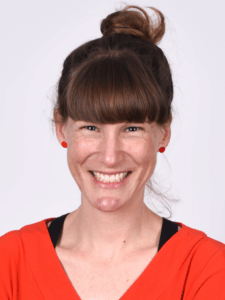
Sonja Billerbeck
Imperial College London
UK
EMBO Practical Course
Funded by EMBO for excellence in the life sciences
Synthetic Biology (SynBio) has become a maturing field: after more than two decades of development, available tools and knowledge allow wider and more systematic capabilities of designing, engineering, assembling and controlling biological systems for an increasing number of applications. This course will focus on equipping students with hands-on experience on cutting-edge SynBio tools, while supported by lectures from across the field: discussing different aspects of the engineering cycle that also highlight how those are converging towards a better understanding of biology. The programme of this course involves different disciplines relevant for SynBio, such as genetic engineering, cell biology and machine-learning.
In this course you will learn how they can be integrated to learn about biological complexity and especially how they can be used to design and engineer biological systems. We will focus on diverse natural organisms, including bacteria, eukaryotic organisms, and also synthetic cell-like systems. The schedule includes lectures by experts, student poster presentations and our proposed experimental program:
The course is directed to PhD students and early post-doctoral researchers active in molecular biology, biotechnology, systems biology, and bioengineering.
When submitting your letter of motivation, please select one of the three practical modules offered for the on-site course. Participants will be assigned to their preferred practical module and will participate in that module’s activities for the entire duration of the course.
The participants will learn about the experimental and computational design and workflow of Synthetic Biology studies and gain understanding about the possibilities and limitations of synthetic biology in different areas.
“The workshop felt like one of the most valuable weeks in my career. The incredibly dense schedule felt fun and easy in the incredibly warm and supportive environment that the organisers and EMBL created. It was a perfect environment to get to know peers and leaders in the field in both structured and informal settings. The course was a great space to learn, askquestions at every level of simplicity or complexity, and really grow as a scientist. I’m already using what I learned in the lab, and I imagine I will refer back to this experience frequently over the years to come” — Frea Mehta, Technical University of Munich, Germany
“Excellent course in state-of-the-art facilities with exceptional speakers. I loved meeting and becoming friends with an international team of young scientists in the beautiful city of Heidelberg. It is an intense program but you are very proud of yourself and your teammates by the end of it! The organisers and trainers go above and beyond to provide you the best experience.” — Louie Destouches, University College London, UK
This event has been granted the following EMBO sustainability badge:
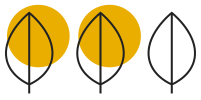

Imperial College London
UK
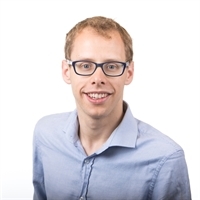
Wageningen University & Research
The Netherlands
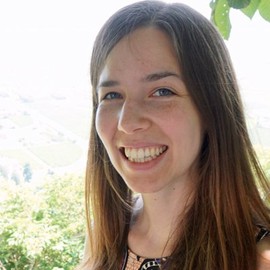
University of Leeds
UK
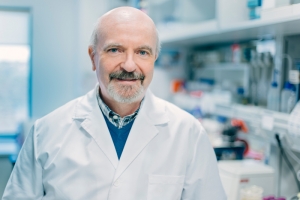
Spanish National Research Council – CSIC
Spain
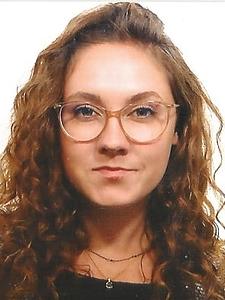
EPFL
Switzerland
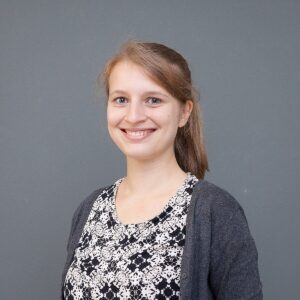
Heidelberg University
Germany
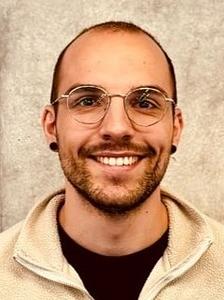
EPFL
Switzerland
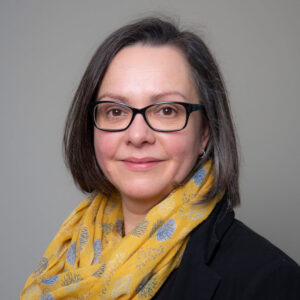
University of Edinburgh
UK
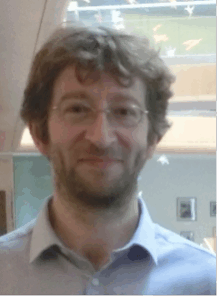
University of Cambridge
UK
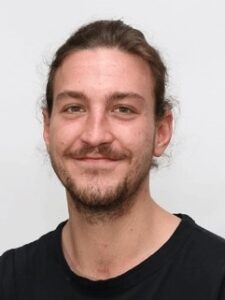
EPFL
Switzerland
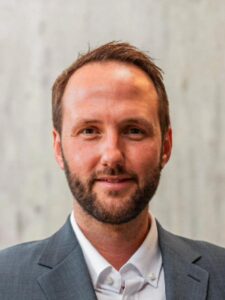
EPFL
Switzerland
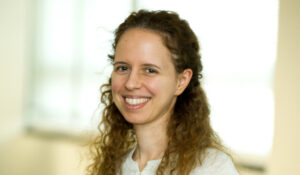
Imperial College London
UK
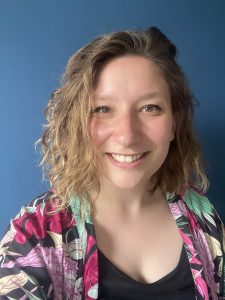
Wageningen University & Research
The Netherlands
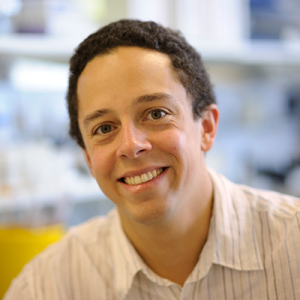
KU Leuven
Belgium
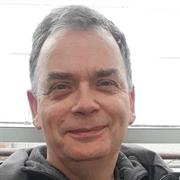
University College London
UK
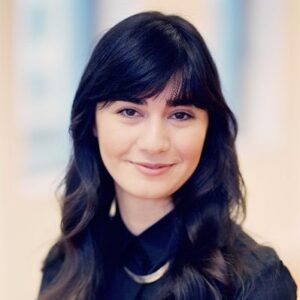
Wageningen University & Research
The Netherlands
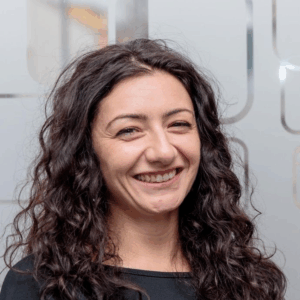
Istituto Italiano di Tecnologia
Italy

KU Leuven
Belgium
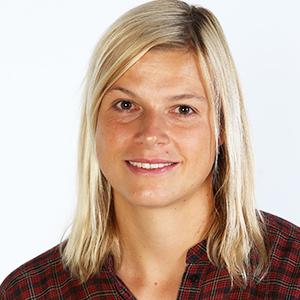
VIB Leuven
Belgium
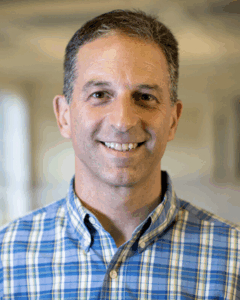
Massachusetts Institute of Technology
USA

Wageningen University & Research
The Netherlands

EPFL
Switzerland

KU Leuven
Belgium

Istituto Italiano di Tecnologia
Italy
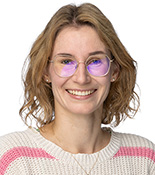
Scientific Training Officer
EMBL Heidelberg
Germany
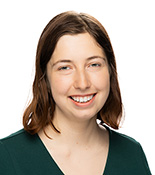
Course and Conference Officer
EMBL Heidelberg
Germany
Are you on social media? Post using #EMBOSynBio and don’t forget to tag @EMBLEvents.
Please note, selected participants will spend the entire course in one of the course modules.
| Time (Europe/Berlin) | Session | Location |
|---|---|---|
| 13:15 – 13:30 | Bus from hotel to EMBL ATC Entrance | ISG Hotel |
| 13:45 – 14:15 | Welcome session Nico Claassens – Wageningen University, Netherlands | Courtyard Room A & B |
| 14:15 – 14:45 | Safety briefing, house notes | Courtyard Room A & B |
| 14:45 – 15:15 | Welcome and course overview | Courtyard Room A & B |
| 15:15 – 15:45 | Flashtalks (1 minute per pax) | Courtyard Room A & B |
| 15:45 – 16:15 | Coffee Break & Treasure hunt part 1 | Courtyard Room A & B |
| 16:15 – 16:45 | Introduction to practicals | Training Labs |
| 16:45 – 17:45 | Parallel practical sessions – Practical 1.: Multiplex genome and plasmid engineering (MAGE) in bacteria Trainers: Nico Claassens, Charlotte Koster, Saphyra Thonon – Practical 2.: RNA-wide tools for system control in mammalian cells Trainers: Velia Siciliano and one member of her team – Practical 3.: AI models for translation initiation engineering in bacteria Trainers: Markus Jeschek, Charlotte Desczyk, Clemens Hausmann, Nicolas Jaenisch | Training Lab A & B and Computer Training Lab |
| 17:45 – 18:45 | Lecture 1: topic tba Victor de Lorenzo – Spanish National Research Council – CSIC, Spain | Courtyard Room A & B |
| 18:45 – 19:00 | Bus departure to ISG Hotel | EMBL Bus stop |
| 19:00 – 21:00 | BBQ Dinner and networking (ice breaker) | ISG Hotel |
| Time (Europe/Berlin) | Session | Location |
|---|---|---|
| 08:55 – 09:00 | Overview of the day | Courtyard Room A & B |
| 09:00 – 11:00 | Parallel practical sessions Practicals continued: – Practical 1.: Multiplex genome and plasmid engineering (MAGE) in bacteria Trainers: Nico Claassens, Charlotte Koster, Saphyra Thonon – Practical 2.: RNA-wide tools for system control in mammalian cells Trainers: Velia Siciliano and one member of her team – Practical 3.: AI models for translation initiation engineering in bacteria Trainers: Markus Jeschek, Charlotte Desczyk, Clemens Hausmann, Nicolas Jaenisch | Training Lab A & B and Computer Training Lab |
| 11:00 – 11:30 | Coffee Break and Meet the Speaker (Victor de Lorenzo) | Courtyard Room A & B |
| 11:30 – 12:30 | Lecture 2: Quantitative approaches in synthetic biology Eszter Csibra – University of Leeds, UK | Courtyard Room A & B |
| 12:30 – 13:00 | Technology pitches: industry solutions for synbio challenges / synbio solutions for industry | Courtyard Room A & B |
| 13:00 – 14:00 | Technology Lunch | EMBL Canteen |
| 14:00 – 16:00 | Parallel practical sessions – Practicals continued: – Practical 1.: Multiplex genome and plasmid engineering (MAGE) in bacteria Trainers: Nico Claassens, Charlotte Koster, Saphyra Thonon – Practical 2.: RNA-wide tools for system control in mammalian cells Trainers: Velia Siciliano and one member of her team – Practical 3.: AI models for translation initiation engineering in bacteria Trainers: Markus Jeschek, Charlotte Desczyk, Clemens Hausmann, Nicolas Jaenisch | Training Lab A & B and Computer Training Lab |
| 16:00 – 16:30 | Coffee Break and Meet the Speaker (Sybille Vonesch) | Courtyard Room A & B |
| 16:30 – 17:30 | Lecture 3: Sustainable biotechnology and metal upcycling Louise Horsfall – University of Edinburgh, UK | |
| 16:30 – 18:00 | Sustainability Roundtable Discussion: Interactive Discussion with participants and speakers (inc. Louise Horsfall): Sustainability & SynBio | Courtyard Room A & B |
| 18:00 – 19:00 | Poster Session 1 Poster session with presentations from participants 1-10 (4 mins per presentation) | ATC Helix A |
| 19:00 – 20:00 | Dinner | EMBL Canteen |
| Time (Europe/Berlin) | Session | Location |
|---|---|---|
| 08:55 – 09:00 | Overview of the day | Courtyard Room A & B |
| 09:00 – 11:00 | Parallel practical sessions Practicals continued: – Practical 1.: Multiplex genome and plasmid engineering (MAGE) in bacteria Trainers: Nico Claassens, Charlotte Koster, Saphyra Thonon – Practical 2.: RNA-wide tools for system control in mammalian cells Trainers: Velia Siciliano and one member of her team – Practical 3.: AI models for translation initiation engineering in bacteria Trainers: Markus Jeschek, Charlotte Desczyk, Clemens Hausmann, Nicolas Jaenisch | Training Lab A & B and Computer Training Lab |
| 11:00 – 11:30 | Coffee break and Meet the Speaker (Louise Horsfall) | Courtyard Room A & B |
| 11:30 – 12:30 | Lecture 4: Precision genome editing and systems genetics Sybille Vonesch – KU Leuven, Belgium | Courtyard Room A & B |
| 12:30 – 13:30 | Lunch | EMBL Canteen |
| 13:30 – 16:00 | Parallel practical sessions Practicals continued: – Practical 1.: Multiplex genome and plasmid engineering (MAGE) in bacteria Trainers: Nico Claassens, Charlotte Koster, Saphyra Thonon – Practical 2.: RNA-wide tools for system control in mammalian cells Trainers: Velia Siciliano and one member of her team – Practical 3.: AI models for translation initiation engineering in bacteria Trainers: Markus Jeschek, Charlotte Desczyk, Clemens Hausmann, Nicolas Jaenisch | Training Lab A & B and Computer Training Lab |
| 16:00 – 16:30 | Coffee break and Meet the Speaker (Sybille Vonesch) | Courtyard Room A & B |
| 16:30 – 17:30 | Lecture 5: Systems biology approaches for bioprocessing Cleo Kontoravdi – Imperial College London, UK | Courtyard Room A & B |
| 17:30 – 19:00 | Parallel practical sessions Practicals continued: – Practical 1.: Multiplex genome and plasmid engineering (MAGE) in bacteria Trainers: Nico Claassens, Charlotte Koster, Saphyra Thonon – Practical 2.: RNA-wide tools for system control in mammalian cells Trainers: Velia Siciliano and one member of her team – Practical 3.: AI models for translation initiation engineering in bacteria Trainers: Markus Jeschek, Charlotte Desczyk, Clemens Hausmann, Nicolas Jaenisch | Training Lab A & B and Computer Training Lab |
| 19:00 – 20:00 | Pizza dinner and Career Session: Industry and academic speakers – Career in synbio | ATC Helix A |
| 20:00 – 20:15 | Bus departure to ISG Hotel | EMBL Bus Stop |
| Time (Europe/Berlin) | Session | Location |
|---|---|---|
| 08:55 – 09:00 | Overview of the day | Courtyard Room A & B |
| 09:00 – 11:00 | Parallel practical sessions Practicals continued: – Practical 1.: Multiplex genome and plasmid engineering (MAGE) in bacteria Trainers: Nico Claassens, Charlotte Koster, Saphyra Thonon – Practical 2.: RNA-wide tools for system control in mammalian cells Trainers: Velia Siciliano and one member of her team – Practical 3.: AI models for translation initiation engineering in bacteria Trainers: Markus Jeschek, Charlotte Desczyk, Clemens Hausmann, Nicolas Jaenisch | Training Lab A & B and Computer Training Lab |
| 11:00 – 11:30 | Coffee break and Meet the Speaker (Cleo Kontoravdi) | Courtyard Room A & B |
| 11:30 – 12:30 | Lecture 6: Synthetic biology in photosynthetic microbes Saul Purton – University College London, UK | Courtyard Room A & B |
| 12:30 – 13:30 | Lunch at EMBL Canteen followed by group photo | EMBL Canteen |
| 13:30 – 15:30 | Parallel practical sessions Practicals continued: – Practical 1.: Multiplex genome and plasmid engineering (MAGE) in bacteria Trainers: Nico Claassens, Charlotte Koster, Saphyra Thonon – Practical 2.: RNA-wide tools for system control in mammalian cells Trainers: Velia Siciliano and one member of her team – Practical 3.: AI models for translation initiation engineering in bacteria Trainers: Markus Jeschek, Charlotte Desczyk, Clemens Hausmann, Nicolas Jaenisch | Training Lab A & B and Computer Training Lab |
| 15:30 – 15:45 | Short coffee break | |
| 15:45 – 16:45 | Lecture 7: Engineering and building circuits in mammalian cells Ross Weiss – MIT, USA (online lecture) | Courtyard Room A & B |
| 16:45 – 17:45 | Coffee break and Meet the Virtual Speaker (Ron Weiss) | Courtyard Room A & B |
| 17:45 – 18:45 | Parallel practical sessions Practicals continued: – Practical 1.: Multiplex genome and plasmid engineering (MAGE) in bacteria Trainers: Nico Claassens, Charlotte Koster, Saphyra Thonon – Practical 2.: RNA-wide tools for system control in mammalian cells Trainers: Velia Siciliano and one member of her team – Practical 3.: AI models for translation initiation engineering in bacteria Trainers: Markus Jeschek, Charlotte Desczyk, Clemens Hausmann, Nicolas Jaenisch | Training Lab A & B and Computer Training Lab |
| 18:45 – 19:45 | Update on laboratory work by each team | Courtyard Room A & B |
| 19:15 – 20:15 | Dinner in EMBL Canteen | EMBL Canteen |
| 20:15 – 21:15 | Interactive Lecture 8 on Responsible conduct of research Responsible conduct of research workshop Zoe Robaey – WUR, Netherlands | Courtyard Room A & B |
| 21:15 – 21:30 | Bus to ISG Hotel | EMBL Bus stop |
| Time (Europe/Berlin) | Session | Location |
|---|---|---|
| 08:55 – 09:00 | Overview of the day | Courtyard Room A & B |
| 09:00 – 11:00 | Parallel practical sessions Practicals continued: – Practical 1.: Multiplex genome and plasmid engineering (MAGE) in bacteria Trainers: Nico Claassens, Charlotte Koster, Saphyra Thonon – Practical 2.: RNA-wide tools for system control in mammalian cells Trainers: Velia Siciliano and one member of her team – Practical 3.: AI models for translation initiation engineering in bacteria Trainers: Markus Jeschek, Charlotte Desczyk, Clemens Hausmann, Nicolas Jaenisch | Training Lab A & B and Computer Training Lab |
| 11:00 – 11:30 | Coffee break and Meet the Speaker (Zoe Robaey) | Courtyard Room A & B |
| 11:30 – 12:30 | Lecture 9 Synthetic biology in yeast and fungi Sonja Billerbeck – Imperial, UK | Courtyard Room A & B |
| 12:30 – 13:30 | Lunch at EMBL Canteen | EMBL Canteen |
| 13:30 – 15:30 | Parallel practical sessions Practicals continued: – Practical 1.: Multiplex genome and plasmid engineering (MAGE) in bacteria Trainers: Nico Claassens, Charlotte Koster, Saphyra Thonon – Practical 2.: RNA-wide tools for system control in mammalian cells Trainers: Velia Siciliano and one member of her team – Practical 3.: AI models for translation initiation engineering in bacteria Trainers: Markus Jeschek, Charlotte Desczyk, Clemens Hausmann, Nicolas Jaenisch | Training Lab A & B and Computer Training Lab |
| 15:30 – 16:00 | Coffee break and Meet the Speaker (Sonja Billerbeck) | Courtyard Room A & B |
| 16:00 – 17:00 | Lecture 10 Data-driven engineering of synthetic microbes for sustainable bioproduction Markus Jeschek – EPFL, Switzerland | Courtyard Room A & B |
| 17:00 – 18:00 | Treasure hunt part 2 | Courtyard Room A & B |
| 18:00 – 19:00 | Poster session 2 Poster session with presentations from participants 11-20 (4 minutes per presentation) | ATC Helix A |
| 19:00 – 20:00 | Tapas dinner | ATC Rooftop Lounge |
| 20:00 | Bus departure to ISG Hotel | EMBL Bus stop |
| Time (Europe/Berlin) | Session | Location |
|---|---|---|
| 08:55 – 09:00 | Overview of the day | Courtyard Room A & B |
| 09:00 – 11:00 | Parallel practical sessions Practicals continued: – Practical 1.: Multiplex genome and plasmid engineering (MAGE) in bacteria Trainers: Nico Claassens, Charlotte Koster, Saphyra Thonon – Practical 2.: RNA-wide tools for system control in mammalian cells Trainers: Velia Siciliano and one member of her team – Practical 3.: AI models for translation initiation engineering in bacteria Trainers: Markus Jeschek, Charlotte Desczyk, Clemens Hausmann, Nicolas Jaenisch | Training Lab A & B and Computer Training Lab |
| 11:00 – 11:15 | Coffee break | Courtyard Room A & B |
| 11:15 – 12:15 | Lecture 11 Bottom-up synthetic cells Kerstin Göpfrich – Heidelberg University, Germany | Courtyard Room A & B |
| 12:15 – 13:15 | Lunch at the EMBL Canteen | EMBL Canteen |
| 13:15 – 15:15 | Parallel practical sessions Practicals continued: – Practical 1.: Multiplex genome and plasmid engineering (MAGE) in bacteria Trainers: Nico Claassens, Charlotte Koster, Saphyra Thonon – Practical 2.: RNA-wide tools for system control in mammalian cells Trainers: Velia Siciliano and one member of her team – Practical 3.: AI models for translation initiation engineering in bacteria Trainers: Markus Jeschek, Charlotte Desczyk, Clemens Hausmann, Nicolas Jaenisch | Training Lab A & B and Computer Training Lab |
| 15:15 – 15:45 | Coffee break | Courtyard Room A & B |
| 15:45 – 16:45 | Lecture 12: Synthetic biology based on evolution/XNA Vitor Pinheiro – KU Leuven, Belgium | Courtyard Room A & B |
| 16:45 – 17:30 | Departure to Neckarmünzplatz via ISG | EMBL Bus stop |
| 17:30 – 19:00 | Guided tour of Heidelberg Old Town | |
| 19:00 – 21:00 | Dinner downtown |
| Time (Europe/Berlin) | Session | Location |
|---|---|---|
| 08:55 – 09:00 | Overview of the day | Courtyard Room A & B |
| 09:00 – 11:00 | Presentation of results by individual practical session teams | Courtyard Room A & B |
| 11:00 – 11:30 | Coffee break | Courtyard Room A & B |
| 11:30 – 12:30 | Lecture 13 Innovating protein technologies for therapeutic and vaccine design Mark Howarth – University of Cambridge, UK | Courtyard Room A & B |
| 12:30 – 13:00 | Course wrap up and closing remarks plus treasure hunt results | Courtyard Room A & B |
| 13:00 – 14:00 | Farewell lunch at EMBL Canteen and Meet the Speaker | EMBL Canteen |
| 14:00 | Departure | EMBL Bus stop |
The course is limited to 20 participants. For selection purposes, please note that your application will not be considered without a letter of motivation.
Your registration for the event includes:
For this EMBO course, the fees include accommodation and transportation to and from the ISG Hotel to the venue
| Academia | €500 |
| PhD Student | €500 |
| Industry | €1100 |
The registration fee should be paid only after acceptance to the course. The results will be announced approximately 2-3 weeks after the application deadline.
If you are no longer able to take part in the course, please inform your course contact responsible for this event. Your registration and the submitted motivation letter will be deleted.
Please also check our Terms and Conditions for the cancellation policy.
After you have logged in and successfully registered, you will receive an email asking you to submit your motivation letter. Click on the link provided and enter your motivation letter in the text box provided. Alternatively you can submit your motivation letter by clicking on the link on the confirmation page directly after registering.
Instructions
Please note:
For detailed instructions, please watch our video on how to submit a course motivation letter.
For further information about registration and motivation letter submission please refer to the FAQ page.
Limited financial assistance is provided by the EMBL Advanced Training Centre Corporate Partnership Programme and EMBO in the form of travel grants and childcare grants.
Your place in the meeting is only confirmed by paying the registration fee, which is mandatory even when receiving a fee waiver.
The travel grant will cover the cost of travel (airfare, train, bus, taxi, and visa) and/or registration fees and is provided up to specified caps which are normally as follows:
– up to €500 for any participant travelling to an EMBO Practical Course.
– up to €1000 for any participant working in Chile, India, Singapore or Taiwan travelling to an EMBO Practical Course.
The organisers may reduce the grant cap to accommodate more participants. Recipients will be notified of their travel cap amount when they are informed of the outcome of their application. Original receipts must be provided with your signature for all costs incurred within two months of completion of travel. Scanned copies cannot be accepted.
There is the possibility to apply for a childcare grant to offset child care costs incurred by participants, speakers, trainers and organisers when attending a course. Eligible costs include (but are not limited to) fees for a babysitter or child-care facility and travel costs for a caregiver. Please note that priority will be given to early-stage researchers. There is a limited amount of funding available for the childcare grants and funds will be distributed amongst eligible applicants.
Applies to selected courses only. Availability will be indicated during the abstract or motivation letter submission process.
This grant covers costs related to your attendance to the course (registration, travel and accommodation costs). The grant is restricted to PhD students and postdocs who conduct basic biomedical research.
Whether you are eligible to apply for a travel grant, depends on when you received your university entrance qualification (e.g. Abitur, A-Levels, High School Diploma, Final State Examination):
– for PhD and MD students, as well as graduates, the university entrance qualification must not have been obtained more than 11 years ago at the time of the envisaged course
– for postdocs, the university entrance qualification must not have been obtained more than 13 years ago at the time of the envisaged course
For EMBO Practical Course participants with accessibility needs, there is the possibility to apply for an accessibility grant to offset costs incurred by participants or speakers when participating at a course. Eligible costs include costs incurred for equipment or adaptations to the course environment, or travel costs for an event companion to assist the participant or speaker during the course where necessary, etc.
Please note that priority will be given to early-stage researchers. A maximum amount of €500 can be awarded per participant applying for an EMBO accessibility grant. In order to apply for this grant for EMBO Courses, you must be registered by the application deadline.
If you are attending virtually, you can apply for financial assistance in the submission portal by the abstract deadline. Read the instructions on how to apply for financial assistance. Only submissions for financial assistance will be accepted. Presentation abstracts cannot be submitted here and will be declined.
In your application you will be asked to summarise your current work, answer questions regarding why your lab cannot fund your attendance, and how your attendance will make a difference to your career. Application for financial support will not affect the outcome of your registration application.
*For some events, applications for Childcare Grants will still be done by email. Information about the grant will be sent out shortly after the abstract/motivation letter deadline. Please contact the event Conference Officer if you have any questions.
A selection process will take place with the results announced by email to all applicants / submitters. We aim to announce 3 weeks (21 days) after the abstract submission deadline but delays may occur.”
Selection results do not impact your admission to the meeting. Selection for registration fee waivers and travel grants is based on scientific merit, your current work or study location, the reasons for needing financial support, and the impact this event will have on your career.
Childcare grants will be allocated in the same timeframe (6-8 weeks before the event start date). Please note that priority will be given to early-stage researchers.
Check out this list of external funding opportunities.
For further information about financial assistance please refer to the FAQ page.
We can send you a registration confirmation to support your visa procedure (not an official invitation letter). Please contact the Conference Officer responsible for your event. For more information, please see here.
If you are travelling to Heidelberg via aeroplane, train, car or long-distance bus, you can find useful information here.
Accommodation in single rooms, including breakfast, is included in the registration fee. Accommodation has been booked for the selected participants at the ISG Hotel for the default dates of Monday 29 June 2026 to Monday 6 July 2026 (7 nights). Any additional nights need to be booked and paid for by you.
We recommend that all course participants stay at the ISG Hotel which is the dedicated hotel for the course.
Shuttle buses will go from the ISG Hotel to EMBL and back, mornings and evenings. A bus schedule and location of the bus stops will be made available prior to the meeting.
In addition to the shuttle busses, there is also the public bus 28 that serves the EMBL campus and taxis can be easily booked at any time. For more information, see here.
You may also walk from the ISG Hotel to EMBL (takes up to 30 minutes)
Map to walk from ISG Hotel to EMBL
Address: EMBL Heidelberg, Meyerhofstraße 1, 69117 Heidelberg, Germany
For more information about accommodation and travel, please refer to the FAQ page.
Here you will find useful information for when you are onsite at the event.
All meals and coffee breaks are included in the registration fee. Our catering staff will prepare a variety of vegetarian meals, meat and fish dishes, soups, pasta, fresh fruit and vegetables, as well as a variety of desserts.
Please wear your badge at all times when serving yourself.
No food or drinks are allowed in the auditorium.
Wi-Fi is available on campus using the EMBL-Events network and the event specific password, which will be provided on site. The eduroam network (secure, worldwide roaming access service developed for the international research and education community) is also available.
During the conference, an EMBL Photographer may be taking photos. If you would not like to appear in these, please inform the photographer or a member of the Course and Conference Office.
There are lockers available next to the stairs leading down into the Auditorium. You will find some of those equipped with sockets to charge your smartphone/tablet etc.
In most places the electricity is 220 volts AC (50 cycles). An adaptor and a plug that fits the German socket may be needed for your appliances/laptop (i.e. American, Japanese, etc.). A USB charging station for electronic devices is available at the registration desk.
We can help to print your boarding pass/train ticket. Please send it to events@embl.de and collect your print-outs at the registration desk.
There are lockers available on-site to store your luggage, which require a 2 EURO coin to operate. There is another luggage room on level E0, which is free to use but remains unlocked during the conference.
‘’Lost and Found’’ items are kept at the registration desk until the end of the conference.
There is a nursing room available in the ATC Rooftop Lounge on level A29.
There is a room for prayer, yoga, and meditation, located on level E0 behind the Auditorium. Please be respectful of others using the room.
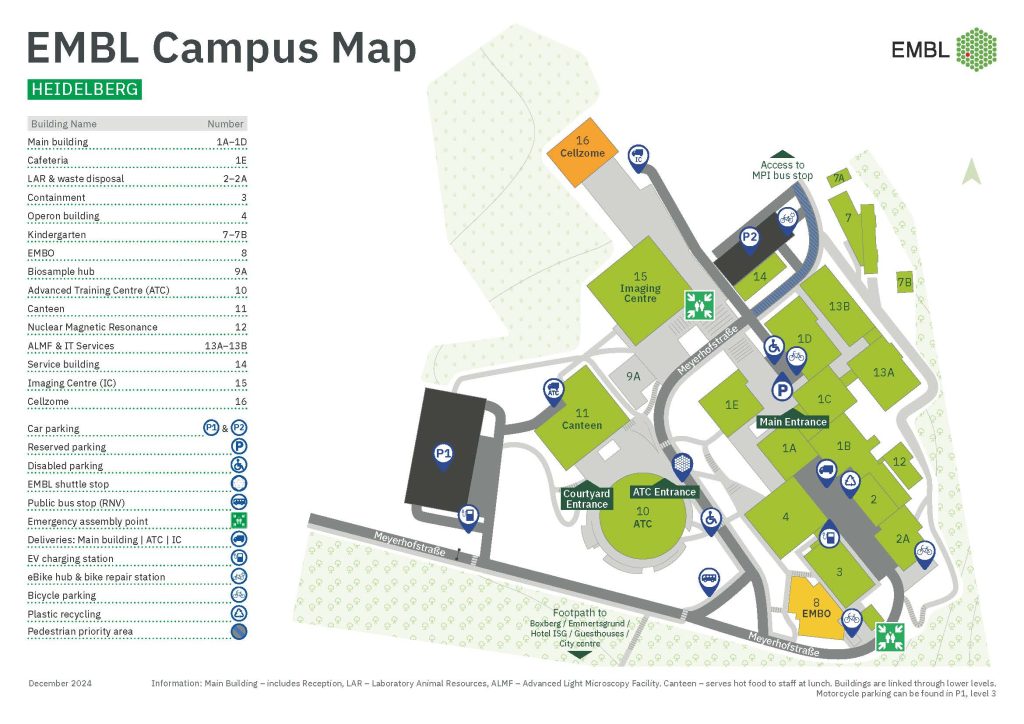
Please take a moment to read our health and safety policy.
If first aid is required
In case of fire
Beyond first aid
The Heidelberg University Hospital or ‘Universitätsklinikum‘ has a 24 hour accident and emergency facility and is at ‘Im Neuenheimer Feld 672’. It is a 8km or a 20 minute taxi ride away from EMBL. In a medical emergency, the ambulance service generally transports patients to this hospital.
Please remember to bring your own medication, if needed, to the conference. Note that the next pharmacy is a 4-minute drive from the EMBL, but for many medications you will be required to see a doctor to get a prescription.
Ensure in advance that your medical insurance will cover you during your visit in the event that you do need to see a doctor while in Heidelberg.
The EMBL course and conference office team are able to advise you on where to turn for emergency or non-emergency medical treatment in Heidelberg and can assist you in making appointments and / or arranging transport to get to the pharmacy or a doctor of your choice if necessary. Please note, we are not however permitted to personally accompany you off-campus.
A variety of activities in Heidelberg can be found on the website of Heidelberg Marketing.
Below you will find the software and technical requirements for this course.
The EMBL eCampus learning platform will be used to collaborate, communicate and network with all of the course participants. All participants will receive information on how to join shortly before the course. We recommend using Chrome, Safari or Mozilla Firefox browsers for eCampus.
Zoom will be used for the live talks and Q&A sessions. More information will be provided closer to the start of the course.
While using the software during the course, please make sure you have nothing else using your bandwidth. We recommend using a wired connection.
Please find additional information including FAQs and terms and conditions on our Information for Participants page.
Sponsorship opportunities
We offer a variety of event sponsoring possibilities, with the flexibility to select a set sponsorship package or combine individual sponsorship options to suit your event budget. Discounts are available for companies sponsoring multiple events at EMBL Heidelberg. View other conferences, or contact sponsorship@embl.org. for further information.
If you are interested in becoming a media partner of this event, please visit our media partnerships webpage.
EMBL advises sponsors to beware of fraudulent schemes falsely offering sponsorship opportunities. All legitimate communication about sponsorship for EMBL conferences, symposia, and courses comes directly from EMBL via official EMBL email accounts. EMBL does not use third parties for sponsorship acquisition.
– EMBL does not sell attendee lists.
– EMBL will never ask for credit card details or direct payments.
– All payments are processed by invoice only.
If you receive a suspicious message claiming to be from or on behalf of EMBL, please report it to sponsorship@embl.org.
Want to let others know you’re attending this event? Take a look at our shareable media and feel free to use them in your social media channels or presentations.

Date: 30 Jun - 6 Jul 2026
Location: EMBL Heidelberg
Venue: EMBL Advanced Training Centre
Deadline(s):
Application: 24 Mar 2026
Organisers:
Contact: Adela Graf